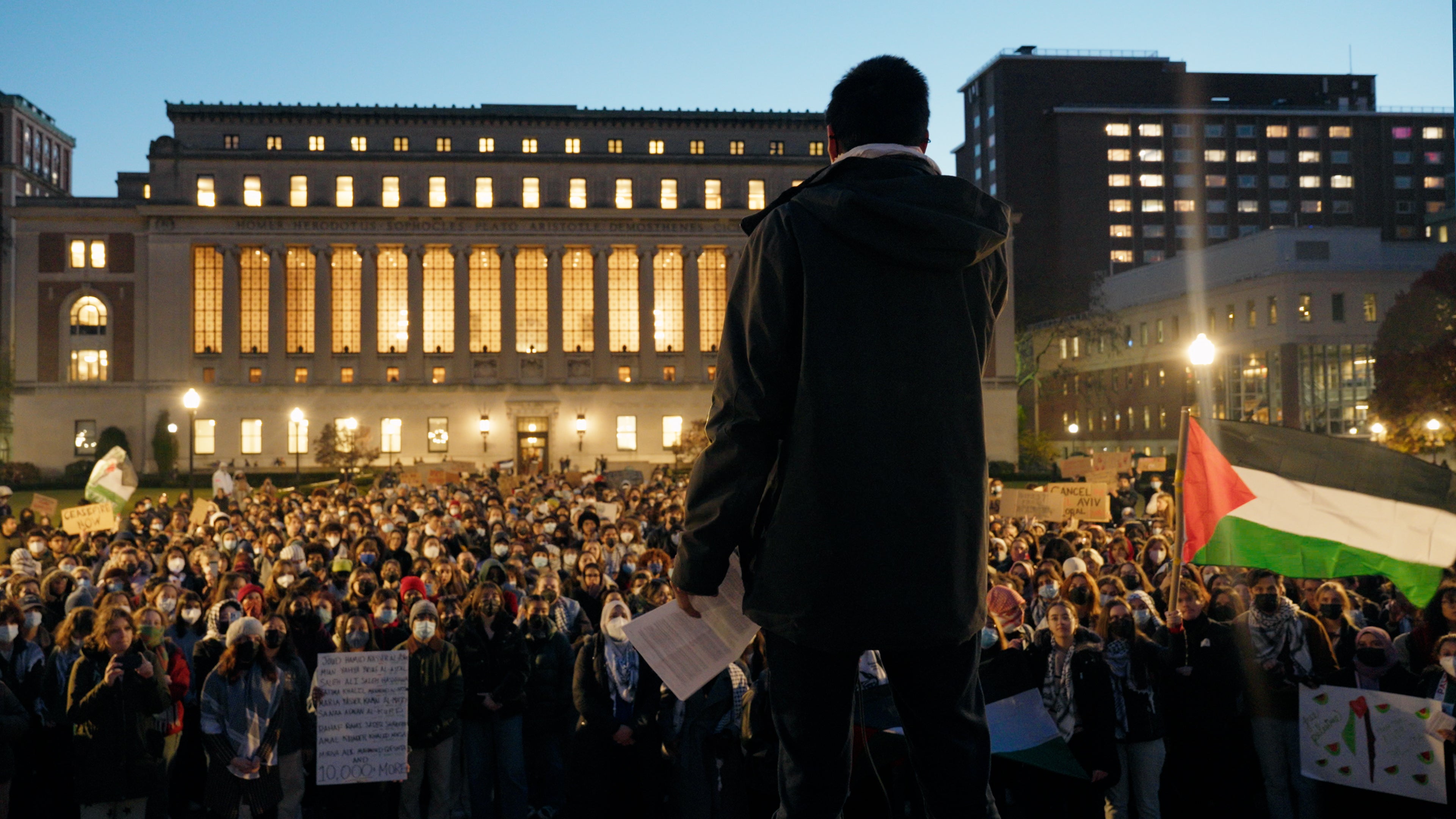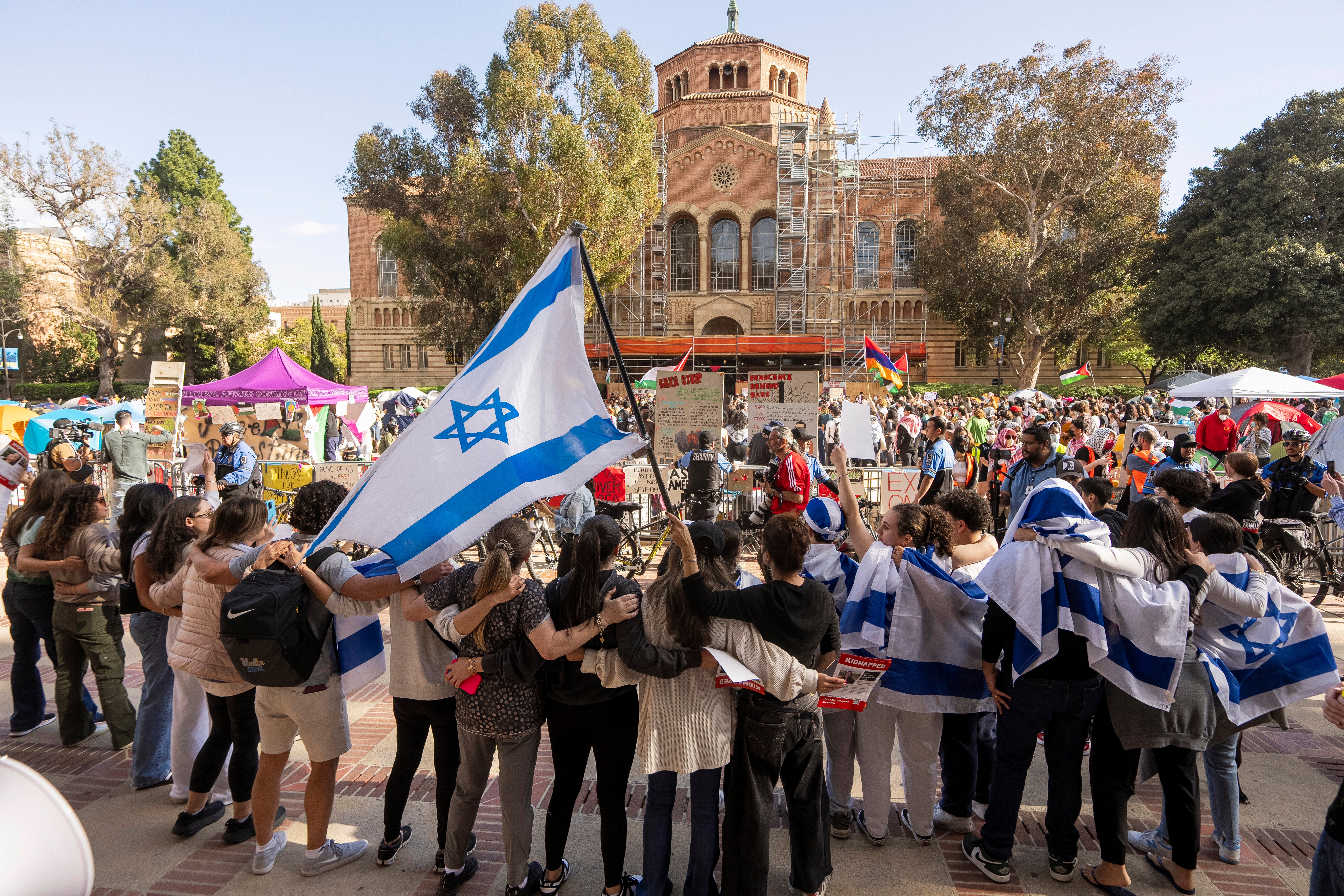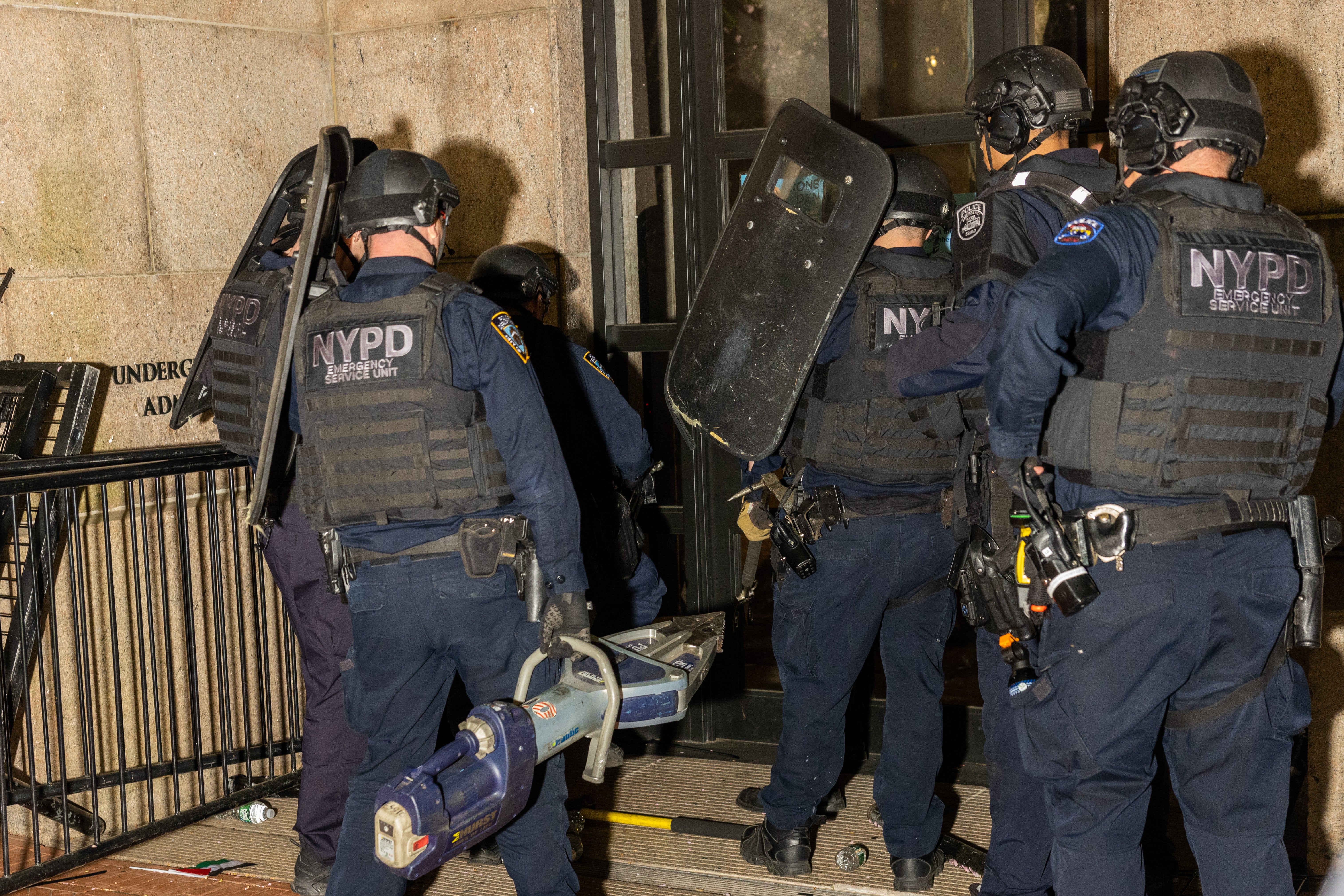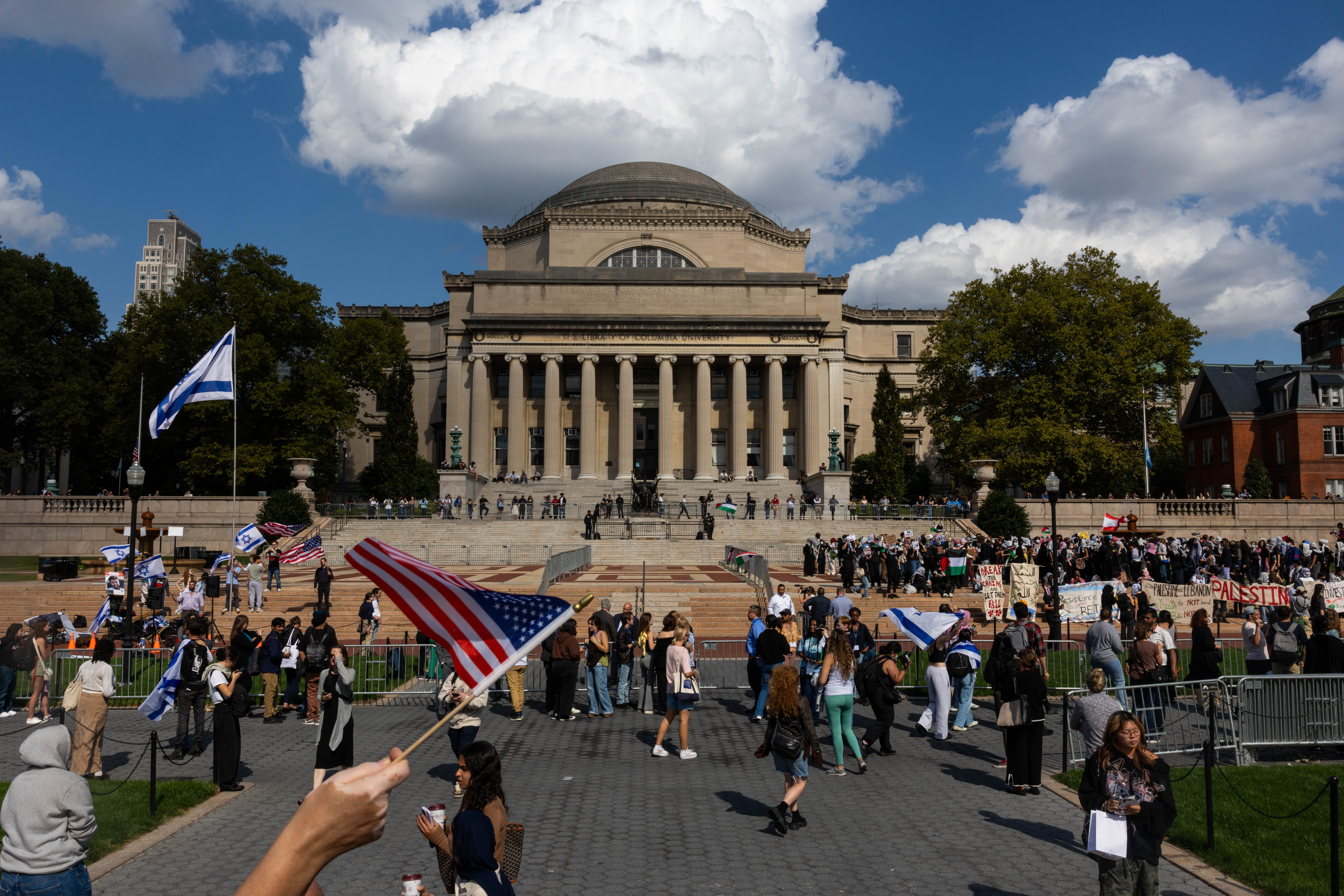The arrival of two recent documentaries about how the Gaza crisis unfolded on U.S. college campuses, October 8 and The Encampments, could not be more timely. The war in Gaza rages on, and so too does the campus crisis it inspired.
Trump has begun following through on a vow to deport all non-citizen university activists with ties to the pro-Palestine faction. This week, masked ICE agents apprehended a Tufts student, for the apparent offense of writing a pro-Palestine op-ed.
The history of how we got here, at least according to these documentaries, remains highly contested.
As October 8, which is in theatres now and executive produced by Debra Messing, tells it, the explosion of pro-Palestine protest that immediately followed the Hamas attack came from a combination of latent antisemitism and mass misunderstanding of the Israel-Palestine situation. The former undoubtedly exists — the stratospheric over-representation of Jews in FBI hate crime data, for example, cannot be ignored — while the latter is more debatable.
Director Wendy Sachs assembles professors, extremism researchers, Israeli officials, and right-leaning commentators who blame the leftward tilt of the protests on a fog of social media algorithms, Hamas propaganda, what they see as an anti-Israel press and a compromised human rights community, and, perhaps most strikingly, the social justice and diversity movement itself.
Viewers are told that within these left-learning spaces, the “snake started eating its own tail” and developed an “orthodoxy that’s unhealthy” singling out Israel and Jews, according to interviewee New York University professor Scott Galloway.

“There’s not a lot of nuance,” he adds, though this statement comes in a documentary where the only Palestinian who speaks is a former Mossad asset.
The Encampments, which debuted in New York this week and has rapper Mackelmore as a producer, features more contemporaneous interviews during the protests as well as more historical analysis. The film suggests that students were motivated by their own experiences, beliefs and education. It notes, for example, that Palestinian refugees and Palestinian-Americans with direct ties to those being annihilated by U.S.-made armaments were among those leading the protests.
Both documentaries also omit seemingly relevant parts of the record, too.

October 8 doesn’t bother trying to reckon with (or even interview) any of the hundreds and likely thousands of Jewish students who helped carry out the encampment protests, many of whom cited the Jewish tradition of social justice activism as their inspiration.
Their absence is all the more glaring given the very real violence the protesters, including the Jewish ones, faced because of their activism. At UCLA, for example, police largely stood by as a gang of masked vigilantes, some draped in Israeli flags, attacked students with fireworks and blunt objects, then fled before officers regained control or made arrests.
If all the encampment protesters were Jew-haters, what does that make the Jews inside the barricades, who ended up in handcuffs or at the hospital for their beliefs? What does that make the people who attacked them?
People like Trump have one response. On the campaign trail, he wondered aloud how anti-Israel Jews “even exist” in America and suggested they needed to get their “head examined.” October 8, understandably, doesn’t quote that, but it does not address the question any other way.

And speaking of Trump, the president and his political influence apparently didn’t warrant a mention either, despite the Republican standard-bearer dining with neo-Nazis, allying closely with the GOP’s pro-Israel megadonors, and using rhetoric on the 2024 campaign trail that non-Americans were “poisoning the blood” of the nation, comments that wouldn’t have been out of place at a Nazi rally.
The Encampment ignores outer edges of its own. There were, undoubtedly, some within the larger student movement who specifically celebrated Hamas’s attack on Israeli civilians and soldiers alike. Others directly used the group’s imagery and language and condoned violence against Jewish Zionists.
Directors Michael T. Workman and Kei Pritsker interview students and faculty in The Encampments who paint the movement as essentially pacifist — and, indeed, the students’ stated demands for divestment, and their central tactic of using camp-outs on the quad, have obvious ties to the methods of the Civil Rights and anti-apartheid movements.
Still, some reckoning with the movement’s understanding of Hamas — Are they a laudable anti-colonial resistance force? Religious fanatics? — would have been illuminating. Instead, the group goes largely unmentioned.

So too do the Biden-era civil rights probes, lawsuits, and university taskforces regarding campus antisemitism, as well as the instances of overtly violent campus vandalism singling out Zionists and Jews.
As a reporter, I can assure you there are very real challenges with trying to define and describe antisemitism, a force as ethereal as a cultural shift or as physical as shattered glass. Further muddying the picture, some of the most widely cited organizations tracking antisemitism, like the Anti-Defamation League, consider criticism of Zionism to be inherently antisemitic.
But it’s still worth trying to unpack the extent of the phenomenon sincerely. Insofar as The Encampment addresses the apparently widespread anxieties of some Jewish students at universities who did not support the encampments, it suggests many were just pro-Israel activists themselves mistaking reasoned critique for violent hate.
The film also paints Columbia University leaders as equal parts callous and cunning, banning activists while allowing mass arrests on campus for the first time since the anti-Vietnam war movement. The administration is only heard obliquely, through then-president Minouche Shafik’s awkward congressional testimony and video statements, rather than given the same direct-to-camera hearing as the protesters.
By their conclusions, both films smash up against a grimmer reality just off-camera.
The final moments of October 8 feature billionaire ex-Meta executive Sheryl Sandberg wondering if her non-Jewish friends would hide her if present-day antisemitism morphed into outright fascism. MIT alum Talia Khan, a pro-Israel campus activist who grew up in a mixed Muslim-Jewish household, visits the site of the Nova festival massacre in Israel. She shudders at the sound of bombs being dropped on Gaza nearby, as she tells the camera, “We want to just live in peace.”
The end credits of The Encampments, meanwhile, inform viewers that two of the main activists profiled in the film are facing down forms of exile and disempowerment. Grant Miner, a Jewish PhD student and union leader, was expelled, while Columbia protest leader Mahmoud Khalil, a Palestinian refugee whose family fled ethnic cleansing in 1948, was arrested by immigration agents and had his legal permanent resident status revoked by the State Department.
If the films agree on one thing, it is that the young people at their center are haunted by generational trauma, and a feeling that the institutions around them are ill-equipped to protect them, while the larger media and political culture does not understand them.







